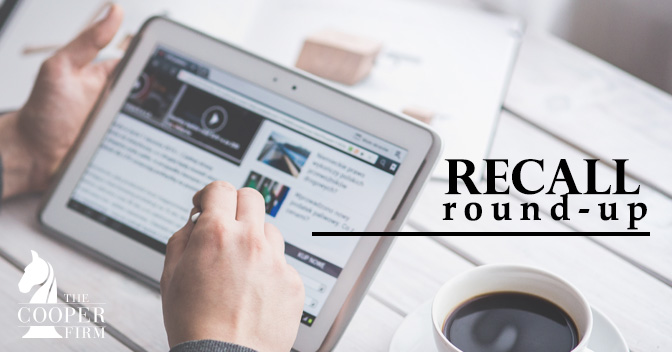Recall Round-Up: June 21, 2019
This week’s installment of our Recall Round-Up series features automobile recalls from Honda, Mazda and Volvo, and product recalls from Target, Apple and American Apparel.
-
Honda CR-V
Honda will recall 119,000 CR-V crossover vehicles due to mechanical issues that causes unexpected airbag deployments. According to the manufacturer, a small metal burr contained in the steering wheel consoles of many 2019 CR-V crossovers can damage internal wiring and cause a short circuit. In addition to an inadvertent airbag deployment, the vehicle may also experience a loss of steering wheel control. Both of these are serious safety hazards that can cause major injury without the vehicle being involved in a crash. Honda received 41 warranty claims over this safety hazard with 3 reports of injury. Owners should expect to receive notification of the recall in July.
-
Mazda6
Mazda recalled nearly 50,000 of their 2011-2013 Mazda6 vehicles due to a potential steering failure. Mazda claims these vehicles may have defective paint that is prone to rust in an area that two suspension components connect. If the connection fails, the driver may experience a sudden and unexpected change in steering which could lead to a crash. The vehicles affected are only those sold or registered in states where roads are salted during the winter. If that condition applies, Mazda encourages owners to call customer service at 800-222-5500, option 4 and mention recall 28181 to receive more information.
-
Volvo XC90 and S60
Volvo announced a recall of more than 40,000 2016 XC90 crossovers and 2019 S60 over coolant and suspension problems. The 2016 XC90 crossover reportedly contains a cracked coolant hose that can leak and cause an engine fire. The cracked hose results from exposure to excessive heat and humidity. The 2019 S60 vehicle had a toe link lock nut that may loosen and cause a rear suspension failure. This failure could lead to a change in how a car handles on the road and possibly lead to a crash. Owners of both vehicles will be notified in June if their vehicle is included in the recall. Owners may also call Volvo at 800-458-1552 and mention recall R29936 for the XC90 or recall R19938 for the S60.
-
Target USB cables
Target issued a recall of 90,000 USB cables due to a possible shock and fire hazard. The USB cords sold for $15 from June 2018 to January 2019 and are marked with a ‘heydey’ label. The retail store received 14 reports of cables smoking or igniting and 2 reports of consumer burns. Target asks consumers to discontinue using the USB cord and return to the store for a refund.
-
American Apparel Infant Sleep sacks
American Apparel announced a recall over 10,000 infant sleep sacks after failing to meet the flammability standard for children’s sleepwear. The Baby Rib collection of cotton blend sleep sacks were sold in sizes 6-12 months for $15-$20 January 2018 thru January 2019. American Apparel encourages consumers to stop using the infant clothing and contact American apparel for a full refund or replacement. Consumers can reach them at 833-222-7760 or visit American Apparel online for more information.
-
Apple Travel Adapter Plug
Apple recalled 814,000 World Travel Adapter Kits this month due to an electric shock risk. According to the US CPSC, the three prong AC wall plug adapter can break and expose the interior metal components. This exposure can pose as a shock risk to consumers. The kits were sold before February 2015 and were made for use in the United Kingdom, Singapore, and Hong Kong. These early edition adapters are solid white while newer releases not included in the recall are white and gray. Apple asks consumers to stop using the recalled adapter and contact them for a free replacement at 800-275-2273 or visit Apple support online.
If you’ve been injured as a result of a recalled product, please contact us today. We also encourage anyone to visit the US Consumer Product Safety Commission and the National Highway Traffic Safety Administration websites to file formal complaints about potential safety hazards.
